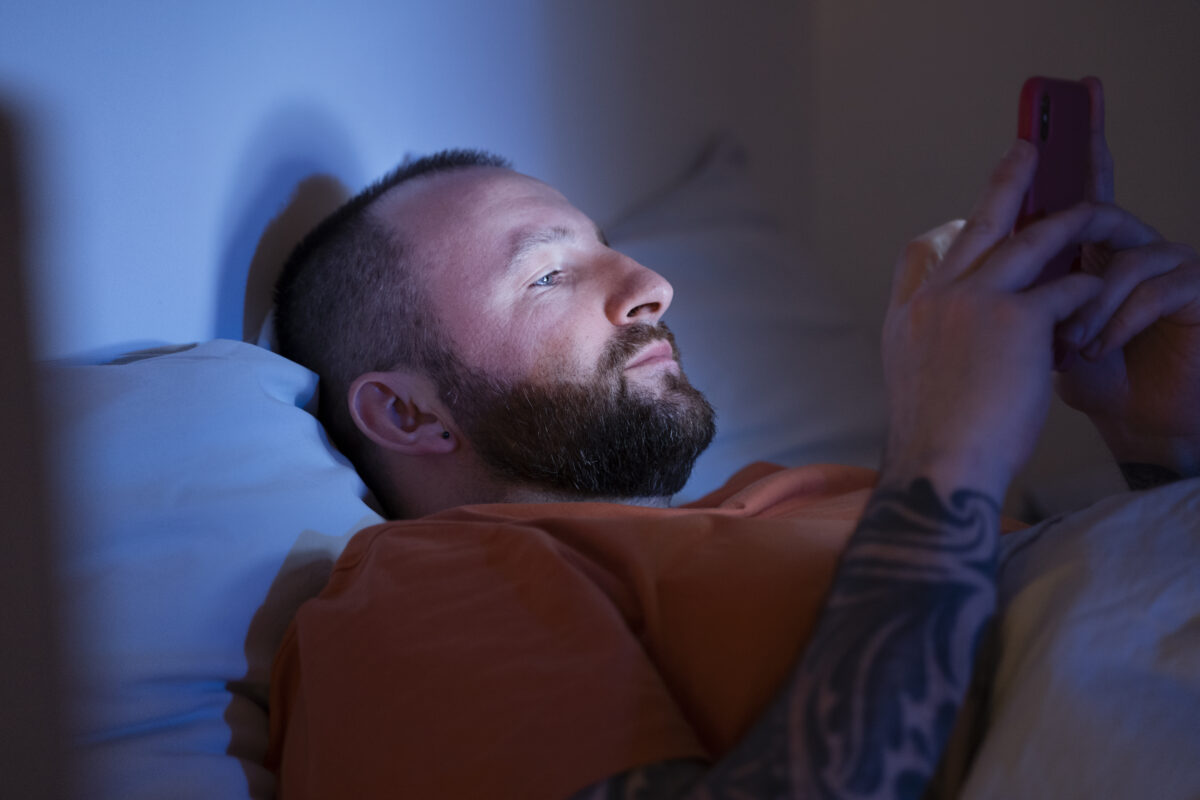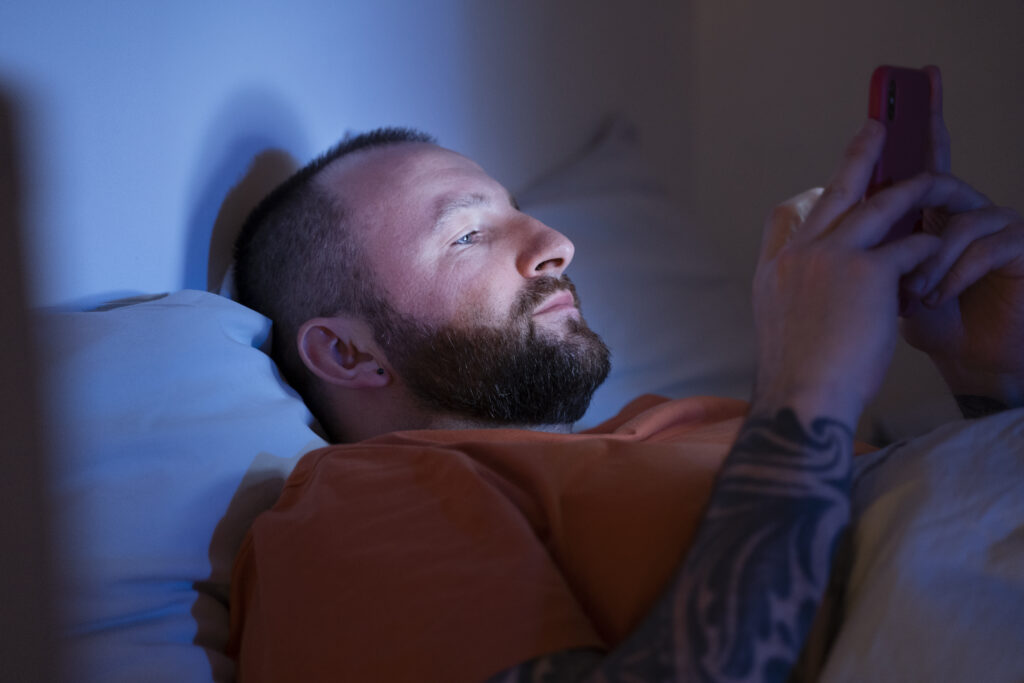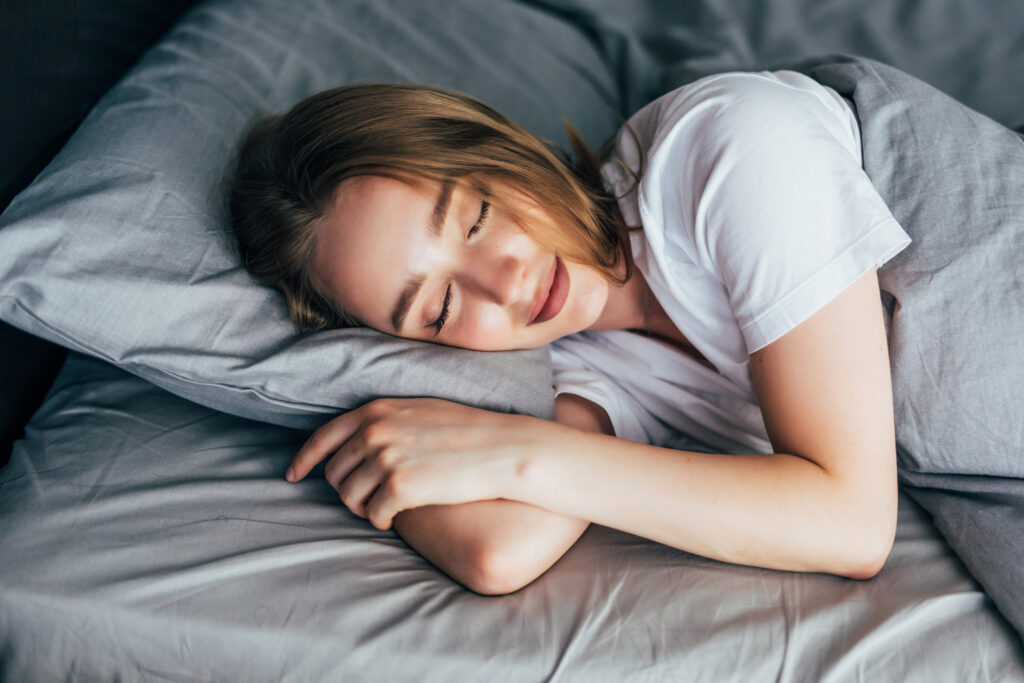
Is Blue Light Really Sabotaging Your Sleep? New Research Says Maybe Not
Many people believe blue light from screens disrupts sleep. We’re often told to avoid screens before bed, wear blue light glasses, and use night mode. But new research suggests blue light’s impact may be smaller than we think. This article explores how technology affects sleep.

Note: This article is intended for general information and educational purposes. It summarizes scientific research in accessible language for a broad audience and is not an official scientific press release.
The Blue Light Myth: A Closer Look
Some believe blue light delays sleep by interfering with melatonin. Melatonin is the hormone that controls our sleep-wake cycle. Harvard University research shows blue light during the day helps us stay awake by mimicking sunlight. But at night, blue light from screens might confuse our brain. It can make us think it’s still daytime. This could delay melatonin production and make it harder to fall asleep.
However, The Conversation analyzed 73 studies with over 113,000 participants and came to a conclusion found that blue light has a very small impact on sleep. It showed that blue light only delayed sleep by 2.7 minutes on average. This suggests other factors might be more important for sleep.
The Role of Psychological Factors
Other factors, like stress, total screen time, and what you watch before bed, might disrupt sleep more than the light itself. A study from the University of California, Berkeley, shows people who believe blue light keeps them awake often have more trouble sleeping. This highlights the power of our thoughts on sleep. But most blue light exposure comes from daylight, which is much stronger than screen light. This challenges the idea that screen time alone greatly affects sleep.
Melatonin and Light Intensity: What Matters Most?
The blue light theory says this light stops melatonin production. But a study by the National Institute of Mental Health found the light intensity needed to stop melatonin is much higher than what our devices emit. Daylight, which has a lot of blue light, can reach 100,000 lux. A smartphone screen emits only 80-100 lux. This difference shows why blue light from screens has little impact on melatonin.
The Importance of Timing in Light Exposure
Beyond brightness, the timing of light exposure is also key. Our bodies follow a natural rhythm that is influenced by light and darkness. Light exposure in the evening, even if it’s not bright, can shift our internal clocks. This can make us feel alert when we should be winding down.
But it’s not just brightness that matters, but when we see the light. Further studies suggest natural light during the day, especially in the morning, helps regulate our rhythms and improve sleep quality at night. So, while screen light might not disrupt melatonin much, balancing light exposure throughout the day is key to good sleep.

The Real Sleep Disruptors: What Should We Worry About?
If blue light isn’t the main sleep disruptor, what is? Research from the Mayo Clinic suggests habits, like when and how we use technology, matter more. For example, using devices late at night can lead to sleep loss. This happens when screen time cuts into sleep time.
Many things in our daily lives can negatively impact sleep. These disruptors include our habits, environment, and daily choices. Below is a list of the top 10 sleep disruptors and why they’re harmful:
- Inconsistent Sleep Schedule: Going to bed and waking up at different times each day disrupts your internal clock. This makes it harder to sleep and wake up naturally.
- Late-Night Technology Use: Using electronic devices late at night delays sleep by keeping your brain engaged. This is especially true if you consume stimulating content like news or social media.
- Caffeine Consumption: Drinking caffeine in the afternoon or evening interferes with sleep. Caffeine blocks adenosine, a chemical that promotes sleep.
- Stress and Anxiety: High levels of stress and anxiety lead to racing thoughts. This makes it hard to relax and fall asleep.
- Poor Sleep Environment: A noisy, bright, or uncomfortable environment makes it hard to get quality sleep. Ideal conditions include a cool, quiet, and dark room.
- Irregular Eating Habits: Eating heavy meals late at night causes discomfort and indigestion. This leads to sleep disturbances. Going to bed hungry can also disrupt sleep.
- Lack of Physical Activity: A sedentary lifestyle leads to poor sleep. Regular physical activity helps regulate your sleep-wake cycle and reduces stress.
- Excessive Alcohol Consumption: While alcohol might make you sleepy at first, it disrupts sleep later in the night. This often leads to fragmented sleep and early awakenings.
- Irregular Exposure to Natural Light: Lack of natural light during the day disrupts your internal clock. Sunlight regulates our circadian rhythm. Without enough daylight, your body struggles to produce the right amount of melatonin at night.
- Overuse of Naps: Taking long or irregular naps during the day negatively impacts nighttime sleep. This makes it harder to fall asleep at bedtime.
The Takeaway: Rethinking Technology’s Role in Sleep
Given that blue light’s role in sleep disruption may be overstated, it’s important to focus on how we use our devices, rather than just the light they emit. Reducing the impact of screens on your sleep involves not only adjusting your exposure to blue light but also making smart choices about your overall technology use, especially before bed.
- Limit Screen Time Before Bed: Aim to stop using screens at least 1–2 hours before bed. This helps prevent interference with melatonin production, the hormone that controls your sleep-wake cycle.
- Use Blue Light Filters: Use blue light blocking apps or settings on your devices, or wear blue light blocking glasses. These tools can help reduce the impact of screen exposure on your natural sleep patterns.
- Dim Screen Brightness: Lower the brightness of your screens in the evening. Reducing screen brightness can decrease the amount of blue light emitted, which may lessen its impact on sleep.
- Adopt a Night Mode: Enable night mode or warm color settings on your devices, which reduce blue light exposure. Shifting your screen color from blue to warmer tones in the evening can help your brain wind down more naturally as bedtime approaches.
- Increase Daytime Light Exposure: Spend more time outside or near windows during the day. Exposure to natural light during the day helps regulate your circadian rhythm, making your body less sensitive to blue light in the evening.
- Create a Sleep-Conducive Environment: Make your bedroom dark and cool, and reserve it for sleep and relaxation. A dark, quiet, and cool environment enhances sleep quality and helps mitigate the effects of evening blue light exposure.
- Practice Good Sleep Hygiene: Maintain a consistent sleep schedule, avoid caffeine and heavy meals before bed, and create a relaxing bedtime routine. Consistent sleep hygiene practices can improve overall sleep quality and reduce the negative impact of screen use.
- Consider Alternative Activities Before Bed: Engage in relaxing, non-screen-based activities such as reading a book, meditating, or taking a warm bath before bed. These activities help prepare your body for sleep by promoting relaxation and reducing stress.
By focusing on how and when you use technology, you can minimize its impact on your sleep and enjoy better rest and overall well-being.
We live in a world full of screens. So, it’s important to look beyond simple answers. Understanding the complex link between technology and sleep can help us use devices in ways that support our well-being. Good sleep is about more than just screen time. It’s about building habits that promote balance and rest.
The information in this article is provided for informational purposes only and is not medical advice. For medical advice, please consult your doctor.














